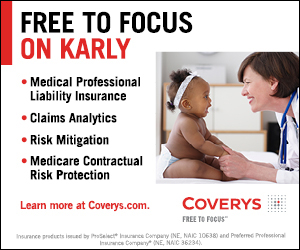Have you completed your LARA required CME? You can do so at your convenience with MSMS’s on-demand webinars. As you know, medical ethics is required as part of your relicensure. MSMS has a full catalog of options that fulfill the requirement including:
Confidentiality: An Ethical Review
This presentation discusses confidentiality from an ethics perspective, what confidentiality is and why it’s an important norm within medical ethics. It also talks about some of the most common questions physicians have about what their obligations are from an ethical perspective when it comes to maintaining patient confidences.
Presented by Michael Redinger, MD, MA, Associate Professor, Western Michigan University Homer Stryker M.D. School of Medicine (WMed). Doctor Redinger is dually appointed in the Department of Medical Ethics, Humanities, and Law, for which he serves as Co-Chair, and the Department of Psychiatry, for which he serves as Interim Chair. He also serves as the current Young Physician Section representative on the Michigan State Medical Society Board of Directors.
Conscientious Objection Among Physicians
Following this presentation, you will be able to define conscientious objection and articulate its growing significance in the landscape of medicine and health care; critically evaluate the AMA’s guidance on physician objections of conscience, as well as Michigan State Law, articulate particularly challenging contexts in which dilemmas involving conscientious objections are exacerbated; and analyze the ethical dimensions of different kinds of cases involving physician conscientious objection.
Presented by Jason Adam Wasserman, PhD, Professor, Oakland University William Beaumont School of Medicine (OUWB). Doctor Wasserman is Professor of Foundational Medical Studies at OUWB, where he also holds an appointment in Pediatrics, is the course director for the Medical Humanities and Clinical Bioethics curriculum, serves as Director of Student Professionalism, the Director of the Holocaust and Medicine program, and as clinical ethics consultant at Beaumont Hospital – Royal Oak.
Learn how to define decision-making capacity and informed consent; explain how assessment of decision-making capacity has ethical implications for obtaining informed consent; explain the difference between patient decision-making capacity and competency; list the clinical standards required for decision-making capacity; identify tools helpful for determination of decision-making capacity; describe misconceptions about decision-making capacity frequently encountered in the clinical setting; and analyze clinical cases pertaining to ethical dilemmas involving decision-making capacity.
This course also presented by Michael Redinger, MD, MA, Associate Professor, Western Michigan University Homer Stryker M.D. School of Medicine (WMed).
Just Caring: Physicians and Non-Adherent Patients
During this presentation you will learn to identify the major reasons why patients might be non-adherent; identify the major ethical considerations that create ethical challenges in caring appropriately for non-adherent patients; become more reflective and self-critical with regard to your emotional responses to non-adherent patients; and consider more constructive approaches to addressing issues of non-adherence with your patients.
Presented by Leonard Fleck, PhD, Professor, Center for Bioethics and Social Justice, Philosophy Department, Michigan State University. Doctor Fleck is a philosophy professor and medical ethicist. He earned his Ph.D. from St. Louis University in 1975 and taught courses at St. Mary’s College (Indiana) before going on to teach at Michigan State University.
Reclaiming the Borders of Medicine: Futility, Non-Beneficial Treatment, and Physician Autonomy
This presentation will help you to meaningfully and respectfully engage in discussions about the ethical duties of a physician; understand the history and the current legal landscape of medically non-beneficial treatment (futility), palliative care, and end of life; apply a basic framework of case analysis in ethical conflicts end-of-life decision-making, including determinations of non-beneficial treatment, surrogate decision-makers, informed consent, and informed refusal of treatment; and understand and strive to embody the ideals of a virtuous physician, including but not limited to: altruism, compassion, empathy, trustworthiness, honesty, integrity, solidarity, and devotion to their patients.
Presented by Tyler S. Gibb, PhD, JD, Co-Chair and Associate Professor, Western Michigan University Homer Stryker M.D. School of Medicine (WMed), and Parker Crutchfield, PhD, Associate Professor, Western Michigan University Homer Stryker M.D. School of Medicine (WMed). Doctor Gibb completed a clinical ethics fellowship at University of California‐Los Angeles, Health System Ethics Center. Prior to that, he completed his PhD in Health Care Ethics from Saint Louis University. He also obtained a law degree (JD) with a certification in Health Law from the Saint Louis University School of Law. Doctor Crutchfield received his undergraduate degree in philosophy at the University of Michigan, Ann Arbor. He completed his PhD in philosophy at Arizona State University, working in applied ethics, epistemology, and the philosophy of science. Following graduate school, he was assistant professor of ethics and the inaugural director of research at the Missouri School of Dentistry and Oral Health at A.T. Still University, a school which he helped found. As Associate professor in the Program in Medical Ethics, Humanities and Law at WMed, Doctor Crutchfield conducts clinical ethics consultations, teaches medical students and residents, and conducts research in medical ethics.
Following this presentation, you will be able to describe the history of research ethics; analyze the conditions for ethically acceptable research; and apply ethical considerations to the design and conduct of human subject research.
This course also presented by Parker Crutchfield, PhD, Associate Professor, Western Michigan University Homer Stryker M.D. School of Medicine (WMed).
For a complete listing our on-demand webinars and to register click here.
Statement of Accreditation:The Michigan State Medical Society (MSMS) is accredited by the Accreditation Council for Continuing Medical Education (ACCME) to provide continuing medical education for physicians.
AMA Credit Designation Statement:The MSMS designates this live activity for a maximum of 1 AMA PRA Category Credit(s)™. Physicians should claim only the credit commensurate with the extent of their participation in the activity.
Nurses: The ACCME is approved by the Board of Nursing as an acceptable provider of continuing education for license renewal or relicensure.













